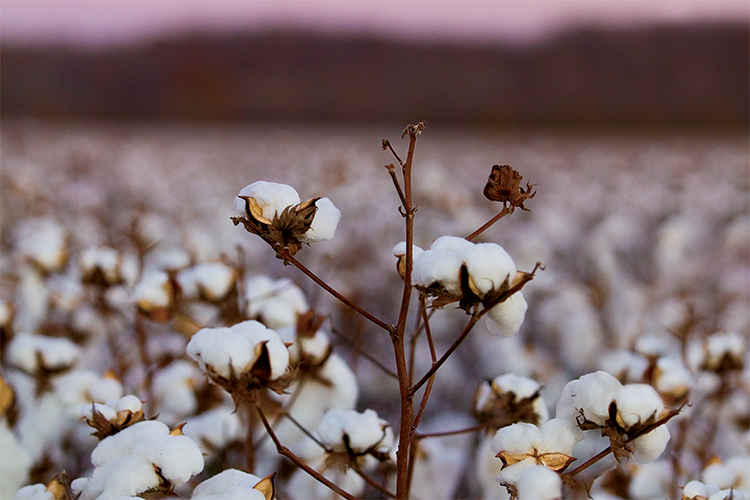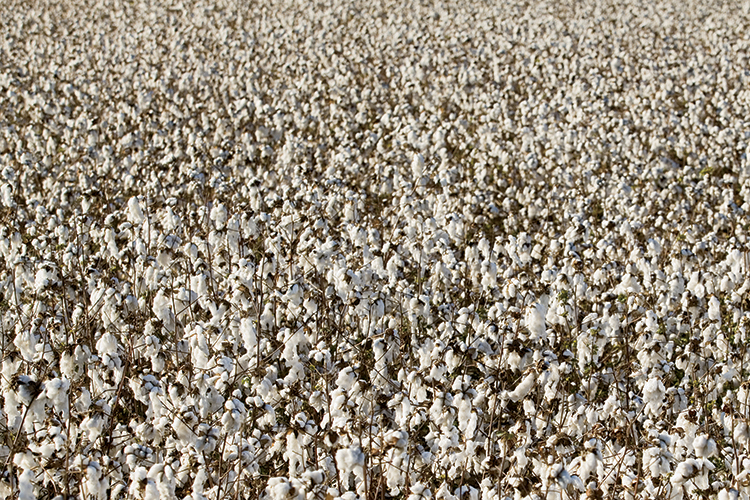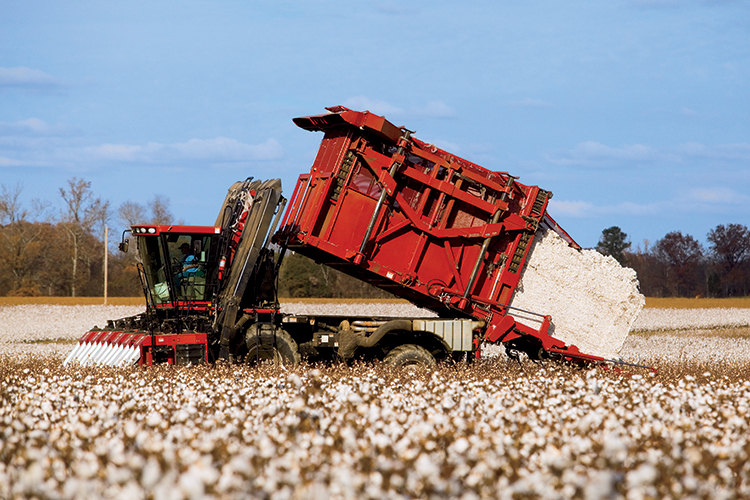Home > Georgia > Georgia Crops & Livestock > High Cotton in Georgia
High Cotton in Georgia

Georgia’s No. 1 row crop might surprise you if you’re not familiar with the agriculture industry. It isn’t the peanuts, pecans or peaches the state is famous for. Georgia’s No. 1 row crop is actually cotton. And Georgia ranks second in the nation for cotton in terms of acres grown and production.
“We grow very high-quality cotton for the entire world in Georgia. Our cotton is desired by textile mills worldwide,” says Jared Whitaker, a UGA Extension agronomist. “Cotton is able to handle our environment in Georgia. We get a lot of rain, but our soils can dry out fast, and cotton is able to deal with that really well – more so than other crops. Cotton also benefits from Georgia’s long growing season with higher temperatures.”

Cotton 101
Though many people think cotton is only used in clothing, it actually has many more uses. Cotton goes into bed linens, towels and curtains, and cotton seed is crushed into oil for salad dressings or to fry potato chips, for example. Dairy farms feed cotton seed to their cows. Cotton is even used in making money.
“There’s a lot more to a cotton plant than just the cotton lint itself,” says Matt Coley, a fourth-generation cotton grower in Vienna. Coley’s family grows 3,400 acres of cotton and 300 acres of peanuts, and they own a cotton gin that his grandfather purchased in 1945. They process their own cotton at the gin, as well as that of other area farmers. The cotton gin separates the cotton fiber from the seed, turning it into a product they can sell.
“We try to plant the cotton by the second week of April, and we start the harvest around mid-September. We like to be done with harvest by Thanksgiving,” Coley says. “The cotton is picked with a cotton picker, which puts the cotton into a module. From the gin, we send a truck to the field to pick up the modules and bring them back to the gin.”
The cotton then goes through cleaning and drying stages, and the cotton fibers are separated from the seed. Then the fibers go through another cleaning process before being pressed into 500-pound bales. The bales are stored in a warehouse until they are sold to merchants.
“The merchants act as a go-between for the cotton gin and the end users of the cotton,” Coley explains. “The gin takes bids on the cotton for the growers and sells it to the merchant with the best price.”
Cotton prices have declined in recent years, but Coley is optimistic they will rebound.
“It’s going to be tough, but cotton has rebounded from prices lower than these to all-time highs in the past,” he says. “My dad says you have to go with what brought you to the dance, and for us, it’s cotton and peanuts. So we’re sticking with it.”

UGA Cotton Variety Selection Program
Back at UGA Extension, Whitaker and other researchers are working to help farmers choose varieties of cotton that will produce the best results in their area.
Whitaker helped start the University of Georgia Cotton Variety Selection Program, which provides growers with the research-based knowledge they need to boost their bottom line. Selecting the right variety of cotton to plant can make or break a cotton grower’s profits.
“We’ve been growing cotton so long in Georgia that you’d think we’d have it figured out,” Whitaker says. “But we’re always trying to do a better job. We consistently get new technology and new traits, so we take new varieties and varieties we’ve had a long time, and test them all to see which ones are more consistent in their performance over a lot of different environments and soil textures. The program has been extremely valuable because it gives growers an idea of how well different varieties perform.”
Coley looks forward to the day when his family’s cotton operation will be passed on to a fifth generation. He and his wife, Whitney, have two young daughters who already enjoy riding around the farm.
For the Coleys, the cotton industry came full-circle when Whitney opened a clothing boutique called Crimson & Clover in Cordele.
“They try to carry as many 100-percent cotton clothes as they can,” Coley says with a chuckle.




I would like to buy land and grow cotton, where do I get good guidance.